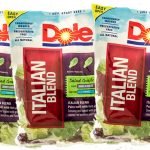There has been a debate in the media for quite some time over whether organic really offer more health value than conventional foods. Organic foods (i.e., produce grown without the use of pesticides and meats coming from animals that were not raised in overcrowded pens or given feed containing man-made chemicals) are often more expensive, leading some people to shy away from them in order to stick to a supermarket budget. But, according to new research that suggests organic foods can help provide protection from cancer, that extra money may be well worth it in the end.
The study, which was conducted at the Institut National de la Sante et de la Recherche Medicale (Inserm) in Paris, France, found that consuming a variety of organic foods on a regular basis may lower the risk of developing cancer.1 Baudry, Julia; et al. “Association of Frequency of Organic Food Consumption With Cancer Risk.” JAMA Internal Medicine. 22 October 2018. Accessed 30 October 2018. http://jamanetwork.com/journals/jamainternalmedicine/article-abstract/2707948. These results are based on an investigation that included 68,946 men and women living in France. With an average age in their mid-40s, more than 75 percent of the subjects were women.
After the participants answered questions about their dietary habits and the frequency with which they consumed 16 types of organic foods, the researchers assigned them a score ranging from 0 to 32 points. The organic products on the list included fruits and vegetables, meats and fish, ready-to-eat prepared foods, condiments, and dietary supplements.
The volunteers were then tracked for an average of four-and-a-half years. Over that period of time, 1,340 of them developed some form of cancer. Since the subject pool had a large majority of women, it is not surprising that the most common cancer to arise was breast cancer, with 459 cases. Other cancers with a high incidence were prostate cancer, with 180 cases; skin cancer, with 135 cases; colorectal cancer, with 99 cases; and non-Hodgkin lymphoma, with 47 cases.
Upon analyzing the subjects’ organic food consumption versus the cancers that developed, it became clear that those who ate the most organic foods had the lowest risk of being diagnosed with any type of cancer. The overall risk for those with high organic food scores was a whopping 25 percent lower than their peers who had low scores for consuming the least organic food.
Some cancers had a more pronounced drop in risk among organic food eaters. The greatest difference appeared in non-Hodgkin lymphoma risk, with those eating the most organic foods shown to be 73 percent less likely to receive this diagnosis. Considerably lower, but still quite significant was breast cancer, for which the participants who ate the most organic foods had a 21 percent lower risk. And volunteers who fell in between, with poor to medium quality overall diets but who consumed organic foods at least occasionally, still benefitted from a reduction in cancer risk.
Before you get too excited over these findings, there were some limitations to the research. It is difficult to know how accurate subjects are when it comes to their self-reporting of the foods they consume. So while it is possible that they provided a realistic picture of what they were choosing to eat, it is also possible that at least some percentage misremembered or weren’t so precise about their diets. Also, since the results were not broken down by categories of food, it is unclear if there are some organic products that might offer more cancer protection than others.
That being said, the results provide strong evidence once again in favor of organic foods. This builds on earlier research, such as a 2014 study at Newcastle University in the United Kingdom that showed organic crops have greater concentrations of antioxidants and lower levels of pesticides and heavy metals such as cadmium.2 Baranski, Marcin; et al. “Higher antioxidant and lower cadmium concentrations and lower incidence of pesticide residues in organically grown crops: a systematic literature review and meta-analyses.” British Journal of Nutrition. 14 September 2014. Accessed 1 November 2018. http://www.ncbi.nlm.nih.gov/pmc/articles/PMC4141693/. So, if you’re not already eating organic, it would certainly make sense as part of a healthy lifestyle to start incorporating more of these foods into your diet. And to learn a little more about organic foods, check out Jon Barron’s informative article “Organic Foods One More Time.”
References
| ↑1 | Baudry, Julia; et al. “Association of Frequency of Organic Food Consumption With Cancer Risk.” JAMA Internal Medicine. 22 October 2018. Accessed 30 October 2018. http://jamanetwork.com/journals/jamainternalmedicine/article-abstract/2707948. |
|---|---|
| ↑2 | Baranski, Marcin; et al. “Higher antioxidant and lower cadmium concentrations and lower incidence of pesticide residues in organically grown crops: a systematic literature review and meta-analyses.” British Journal of Nutrition. 14 September 2014. Accessed 1 November 2018. http://www.ncbi.nlm.nih.gov/pmc/articles/PMC4141693/. |












I am sure that this is going to help a lot of individuals. Keep up the good work. It is highly convincing and I enjoyed going through the entire blog. Cheers!